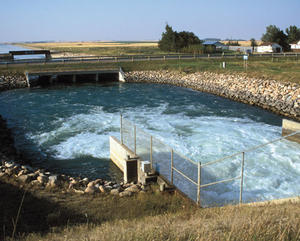The water we drinkCanada's water could be answer for anticipated global water shortages
Global demand for water is projected to exceed supplies by 40 percent in 2030, and Canada may be the answer to minimizing water shortages; it is estimated that in the next twenty years, one third of the world will only have half the water it needs to cover daily needs; to prevent these shortages, researchers are scrambling to develop technologies and practices to reduce water consumption, discover new re-processing techniques, and improve infrastructure; Canada’s water experts are well-suited to assist in this effort as they have gained valuable experience from managing 9 percent of the world’s fresh water supplies

Canada is well-experienced in water management // Source: saskriverbasin.ca
With global demand for water projected to exceed supplies by 40 percent in 2030, Canada may be the answer to minimizing water shortages around the world.
It is estimated that in the next twenty years, one third of the world will only have half the water it needs to cover daily needs.
Zafar Adeel, the chair of United Nations (UN) Water, which leads the water-related efforts of twenty-eight UN organizations, says,”Climate change will affect all societies and ecosystems most profoundly through the medium of water but there is no other way to generalize the crises ahead. At unpredictable times, too much water will arrive in some places and too little in others.”
To prevent these shortages, researchers are scrambling to develop technologies and practices to reduce water consumption, discover new re-processing techniques, and improve infrastructure.
Canada’s water experts are well-suited to assist in this effort as they have gained valuable experience from managing 9 percent of the world’s fresh water supplies. Canada has abundant supplies of freshwater in its lakes and rivers which cover an area roughly the size of Spain, Germany, and Belgium put together.
“We need to brace for what could easily be humanity’s greatest short-term challenges,” says Margaret Catley-Carlson, one of the directors of Canadian Water Network (CWN).
According to Nicholas Parker, chairman of the Cleantech group, “Canada’s relatively abundant water supply will surely be an asset in future as precious as oil was in the 20th Century. It must be managed carefully to ensure it can be harvested sustainably in perpetuity, supporting the well-being of all members of the world community.”
While relatively abundant, Canada’s water supplies are fragile.
“Water is not distributed evenly across Canada, nor are its people, industry and environmental needs. Much of Canada’s water is frozen or flows north, away from populated areas, and just 1 percent of its supply is renewed each year by precipitation. The quality and security of that supply underpin public and environmental health, as well as the economy,” says Bernadette Conant, executive director of Canadian Water Networks.
With the anticipated water shortage, reports estimate that it will cost $200 billion a year to provide water to thirsty areas with supply-side measures only. Using an approach that raises both supply and lowers demand is estimated to require between $50 and $60 billion a year.
“Canada is a vast country and will experience the broad gamut of water challenges, creating the opportunity to further develop and share our broad expertise in how best to deal with them. The dire forecasts are not inevitable if we apply well-demonstrated water management knowledge, technology and social innovations,” Conant says.
In particular, Canada’s experience dealing with catastrophic “hundred year” floods has helped it to develop solutions to mitigate damages from future floods.
Over the past twenty years, Canada’s northern areas have been hit three times by massive hundred year floods, similar to the floods that recently devastated Pakistan and Australia.
Robert Tremblay, research director of the Insurance bureau of Canada, says that extreme weather events have increased 2,000 percent in the past thirty years and flood claims now exceed fire and wind insurance claims each year.
Dr. Hans Schreier, a professor at the University of British Columbia who specializes in watershed management and land-water interactions, suggests that areas vulnerable to floods should implement new approaches to road and street design that Canadians have used.
Curbs, drains, and other non-absorptive surfaces have been replaced wherever possible with grassy depressions that can collect and absorb rain while channeling excess water into newly built wetlands and storm water collection ponds.
Home driveways have also been redesigned using new materials and layouts that maximize its ability to absorb rain water and minimize run off.
In the event of a true emergency, Dr. Schreier recommends intentionally flooding low lying areas like parks, farm lands, and golf courses for weeks at a time during major rain storms to protect urban areas.
“It is cheaper to compensate landowners than to scale up municipal water infrastructure,” he says.
“Sadly, most communities, especially in developing countries, are ill-prepared to adjust to looming new realities. Canadian expertise in water management is greatly needed,” said Adeel.
Canada recently hosted an international meeting of 300 scientists, policy-makers, and economists to present the latest developments in water management techniques and practices.
